About this course
Gain IET accreditation on LJMU's Electrical Power and Control Engineering MSc.
- Study at one the UKs leading Engineering Schools
- Follow a programme informed by internationally-acclaimed research from LJMUs Electrical and Electronic Engineering Research Centre
- Look forward to career success with major UK and international employers
- Meet Chartered Engineer requirements
- This programme is available as a standard full-time Masters one-year programme (180 credits) or as an extended full-time Masters 20 month programme (240 credits).
- On both versions in semesters one and two you will study full-time at LJMU completing the taught modules.
- If you are on the one-year programme, you will complete your Dissertation over the summer.
- If you are on the 20 month programme, you will undertake the Group Design Project and your Dissertation in the second year.
This MSc includes the IET accreditation you need to boost your future employment opportunities. It can even be completed part-time to enable you to study as you remain in employment.
Industry-based research is a key element of the programme, keeping you up-to-date with the latest innovation and preparing you for employment in the sector or further research and PhD study.
Growing demand for electrical power engineers in the energy, automotive, and process industries means that, as a graduate, you could be involved in the design and development of electrical systems, such as those found in hybrid vehicles, cooling systems and aircraft actuators. You may also be working on the generation, distribution, regulation and conversion of electrical power.
During your studies you'll develop advanced analytical and experimental skills to design new power and control systems and learn how to critically analyse designs, their functionality and expected reliability. You will also gain a strong understanding of the capabilities and limitations of modelling and simulation tools.
Students who choose the two year MSc route will undertake a Group Design Project & Dissertation.
The Group Design Project aims to apply engineering, technology and scientific knowledge to a real-world design problem. Detailed ideas will be explored and developed through design, experimentation, computer modelling and/or manufacture.
Why should I choose the 20 month route?
- The Group Design Project will encompass the wider aspects of social, economic, political, legislative, environmental, cultural, ethical and sustainability issues required in the modern environment
- This route is designed for international students who wish to apply their knowledge to professional practice in the UK
- Industrial organisations across all sectors have identified a gap in the market for Engineers with good leadership and interpersonal skills in addition to their technical abilities.
- This route will equip you with the transferrable project management skills needed to excel in your chosen career
- You will work in groups and meet regularly with an academic supervisor and any internal or external stakeholders in order to develop an effective team-working ethic
- You will present your work through regular meetings with your supervisor as well as submitting progress reports and oral presentations. In this way you will have the chance to hone your communicative skills and leave University ready for the workplace
- As an alternative to the group project on the two-year programme an industrial placement is a possibility in year two
- You will need to apply directly to companies offering placements — the offer of a placement will be subject to a successful interview with the employer. Although the University will provide support and guidance to find an appropriate placement they are not guaranteed
- Please note that you cannot apply for the sandwich route before coming to LJMU — further information about applying to placement opportunities will be given during semester two of year one
Course modules
Discover the building blocks of your programme
Further guidance on modules
Modules are designated core or optional in accordance with professional body requirements, as applicable, and LJMU’s Academic Framework Regulations. Whilst you are required to study core modules, optional modules provide you with an element of choice. Their availability may vary and will be subject to meeting minimum student numbers.
Where changes to modules are necessary these will be communicated as appropriate.
Core modules
Research Skills
10 credits
10 credits
The module will help prepare you to undertake your own research project and deliver the required skill set for successful completion of your investigations.
Modelling and Simulation
10 credits
10 credits
Professional and Leadership Skills
10 credits
10 credits
This module will help you to develop an awareness of the legal and ethical framework surrounding the activities of a professional engineer. You will also gain an awareness of the Emotional Competence Framework for a professional engineer. This will help you to develop a specific set of personal and social competency skills appropriate for a professional engineer, such as adaptability, creativity diversification, leveraging diversity, political awareness, leadership and team capabilities.
Modelling and Control of Electric Machines and Drives
20 credits
20 credits
This module will help you to develop an understanding of principles and acquire working knowledge of mathematical modelling of electrical machines. This will introduce you to the principles of control of variable speed electric drives using power electronic converters. In doing so, you will have succinct knowledge regarding the concept of vector control as applied to induction machines.
Control Systems
20 credits
20 credits
This module will provide you with the knowledge as to how you can apply the state space control method for dynamic system modelling, control and analysis.
Dynamic Systems Simulation
20 credits
20 credits
This module will introduce you to the complex dynamic systems simulation using Matlab/Simulink, and Interface of computer controlled system and simulation with LabView.
Digital Control
20 credits
20 credits
This module will extend your knowledge of concepts of digital control theory into system identification, controller design and self-tuning control techniques for single-input, single-output systems.
Power Systems Modelling and Analysis
10 credits
10 credits
This module will help you to develop an understanding of the power system component modelling for steady-state analysis and the types of problems encountered in power system analysis. This will enable you to consider the principles of voltage and reactive power control in power systems.
MSc Dissertation
60 credits
60 credits
This project module provides you the opportunity to demonstrate your ability to drive your own deep/thorough investigation, undertake high quality academic research and demonstrate critical evaluation of your results.
Professional accreditation/links
Accredited by the Institution of Engineering and Technology.

Your Learning Experience
An insight into teaching on your course
Teaching methods
You will learn through lectures and directed student-centered learning, such as case studies.
Applied learning
The programme design enables you to practice communication skills at Chartered Engineer level. You'll gain specific professional skills that can be applied to technical and management roles in power and control engineering.
How learning is monitored on your programme
To cater for the wide-ranging content of our courses and the varied learning preferences of our students, we offer a range of assessment methods on each programme.
Where you will study
What you can expect from your School
The Department of Electrical Engineering is in the Byrom Street complex of LJMU 's City Campus. In addition to specialist engineering facilities, Byrom Street has high quality lecture theatres, meeting and seminar rooms plus social spaces and a large café. The Avril Robarts Library is just minutes away on Tithebarn Street.
Course tutors

Dr Gerard Edwards
- Programme Leader
Gerard started working as a Principal Lecturer in the Electronic & Electrical Engineering Division, School of Engineering, Faculty of Engineering and Technology, in Liverpool John Moores University (LJMU) from Sep. 2021. Gerard is the Programme Leader for the suite of Electronic & Electrical Engineering MSc degrees Electrical Power And Control Engineering, Embedded Systems & IC Design and Wireless Communications, offered at LJMU.Gerard pursued postdoctoral work at the Centre for Solid State Electronics Research, Arizona State University, USA, and the Department of Electrical Engineering, University of Notre Dame, USA. He then worked as a Senior Lecturer, Programme Leader in the Department of Computer Science and then the Department of Engineering at the University of Bolton. He moved to the University of Chester in 2014 to lead the development of the new Department of Electrical and Electronic Engineering.
-
 Lecturer/Senior Lecturer
Lecturer/Senior Lecturer
Career paths
Further your career prospects
LJMU has an excellent employability record with 96% (HESA 2018) of our postgraduates in work or further study six months after graduation. Our applied learning techniques and strong industry connections ensure our students are fully prepared for the workplace on graduation and understand how to apply their knowledge in a real world context.
Electrical power and control engineering is a specialised field which offers many professional opportunities worldwide. A career in this area will enable you to travel widely, working in an exciting and dynamic industry.
This course will develop both the technical and managerial skills you need to succeed in your chosen career. Typical positions include System Designers, Analysts, and Senior Engineers in the fields of electrical engineering, process control and related industries. Leadership and management roles are often secured on graduation.
Tuition fees and funding
- Home part-time per credit:
- £55.11
The University reserves the right to increase tuition fees in accordance with any changes to the maximum allowable fees set by the UK Parliament. In the event of such a change, any fee increase will be subject to a maximum cap of 10% of the total course cost as originally stated at the time of your offer.
Fees
The fees quoted at the top of this page cover registration, tuition, supervision, assessment and examinations as well as:
- library membership with access to printed, multimedia and digital resources
- access to programme-appropriate software
- library and student IT support
- free on-campus wifi via eduroam
Additional costs
Although not all of the following are compulsory/relevant, you should keep in mind the costs of:
- accommodation and living expenditure
- books (should you wish to have your own copies)
- printing, photocopying and stationery
- PC/laptop (should you prefer to purchase your own for independent study and online learning activities)
- mobile phone/tablet (to access online services)
- field trips (travel and activity costs)
- placements (travel expenses and living costs)
- student visas (international students only)
- study abroad opportunities (travel costs, accommodation, visas and immunisations)
- academic conferences (travel costs)
- professional-body membership
- graduation (gown hire etc)
Funding
There are many ways to fund postgraduate study for home and international students. From loans to International Scholarships and subject-specific funding, you’ll find all of the information you need on our specialist postgraduate funding pages.
Please be aware that the UK’s departure from the EU may affect your tuition fees. Learn more about your fee status and which tuition fees are relevant to you.
Entry requirements
You will need:
Qualification requirements
Undergraduate degree
- a minimum 2:2 honours degree in a relevant engineering subject
Alternative qualifications considered
- a professional qualification with considerable relevant work experience
Further information
- Extra Requirements
-
RPL
- RPL is accepted on this programme
International requirements
IELTS
- IELTS English language requirement: 6.0 (minimum 5.5 in each component)
How to apply
Securing your place at LJMU
To apply for this programme, you are required to complete an LJMU online application form. You will need to provide details of previous qualifications and a personal statement outlining why you wish to study this programme.
Your university life
From accommodation and academic support to clubs and societies. Find out what LJMU has to offer.
Related Links
Talk to our students
Connect with a current LJMU student for advice and guidance on university life, courses and more.
See what our students are saying
At LJMU we want you to know you’re making the right choice by studying with us. You can see what our students are saying about their experience with us through their reviews on the following websites:
Related Links
News and views
Browse through the latest news and stories from the university

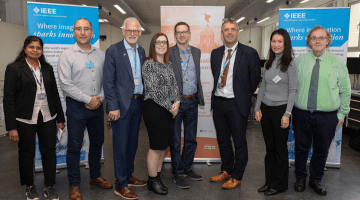
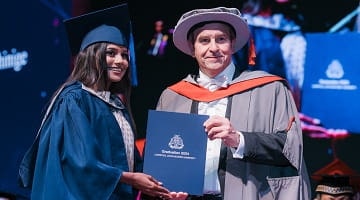
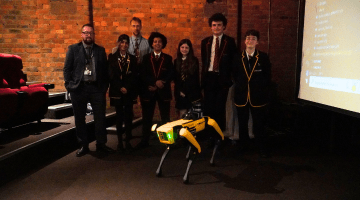
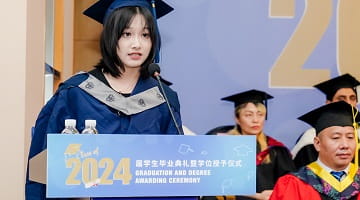




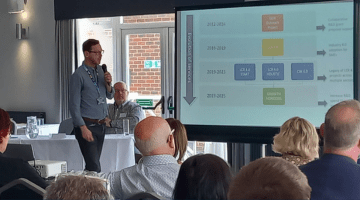
The University reserves the right to withdraw or make alterations to a course and facilities if necessary; this may be because such changes are deemed to be beneficial to students, are minor in nature and unlikely to impact negatively upon students or become necessary due to circumstances beyond the control of the University. Where this does happen, the University operates a policy of consultation, advice and support to all enrolled students affected by the proposed change to their course or module.
















